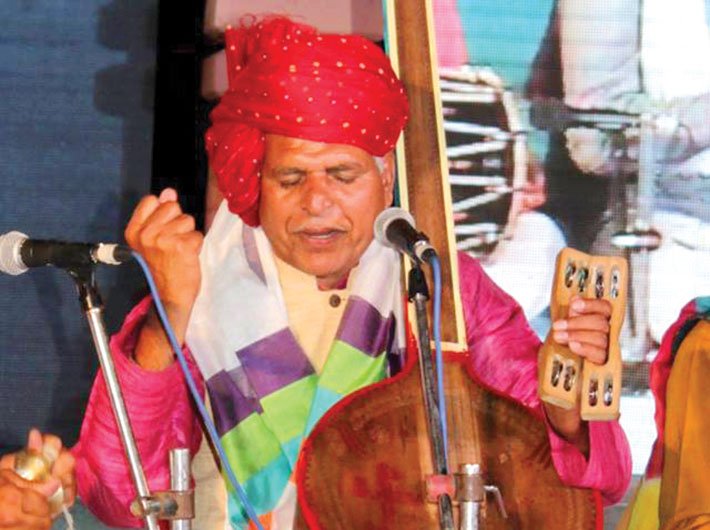Prahlad Tipanya is not a typical musical genius. Before the age of 24, he had no inkling of a career in singing. Nor was music in his genes: his parents were poor and unlettered. He was happy working as a schoolteacher in a village in Madhya Pradesh. But listening to folk songs and bhajans in all-night performances at village chaupals touched a chord in him. For years, he has been singing Kabir bhajans in the Malwi folk style and performing with his troupe including accompanying singers and instrumentalists across India and abroad. Along with other recognition, he was awarded the Padma Shri in 2011.
Your association with music:
When I was young, I saw people singing with the medium of lok vadya (traditional folk musical instruments). These were typically harmonium, dholak, sitar etc. I came across the tambura, with five strings, and it seemed interesting. That’s when I thought that I should learn how to play it. I became mesmerised by it and eventually I started singing Kabir. Usually, lok geet (folk songs) and bhajans are sung at weddings and on occasions like birth of a child.
Your understanding of Kabir’s spirituality:
I started singing Kabir because I realised that his poetry has an effect in our lives. His songs are not just for entertainment, but also rooted in reality – related to our lives. The words in his bhajans made sense when they were written and are practical even today. Kabir spoke about all of mankind; he spoke of whatever he saw – discrimination on the basis of caste, creed and religion. Through his poetry, he spoke about removing superstition, blind faith and evil thoughts.
People may mind his views on Hindus and Muslims but in reality, he didn’t know anything about Hindus and Muslims. His thoughts were not restricted to them. He believed in a supreme power because of which we exist and this power is in all, irrespective of the differences of Hindu-Muslim, girl-boy, desh-videsh (local-foreign).
Life is a journey common for all. This is an important lesson to inculcate in children so that they don’t discriminate between people on the basis of whether they are rich or poor, black or white and so on. They should be taught the importance of living in harmony. We cannot restrict and bind man on any basis and create barriers. And if we do that, then there is no Ishwar, Allah or Wahe Guru.
Kabir spoke of the whole kaynaat (universe). He said that there should be mercy for all living forms because everything that exists is dependent on the other. We should protect each other.
You never had formal training in music.
I still don’t know the raag and swara of music. Sangeet (music), according to me, means andar ki aawaaz (the inner voice). I just sing from within. Sangeet is made of three letters. If we remove the first letter we get ‘geet’; if we remove the last letter we get ‘sangi’; and if we remove the middle letter, we get ‘sant’. Hence, sangeet means geet, sangi and sant. It contains singing, the feeling that everyone is together, each other’s companion and everyone is a saint.
We cannot bind music in a certain way. When singing must have started, people didn’t know which raag, swar and taal there were. It all came afterwards. To know our inner voice we don’t need any formal training.
On folk singing in India:
We need to sing in such a manner that it touches people. This will happen only if the singer and the audience are at the same level. Few knowledgeable classical singers want to sing only in certain places, and there is a chance that people don’t get understand and feel their music. The inner love, faith and yearning of the singer can only be understood by the audience if they stand on the same ground/level.
On performing abroad:
I don’t know how to speak in English and I sang the same Lok Bhajans abroad. People had tears in their eyes and they were dancing to my music. It touched their soul and I was happy to see that.
(The interview appears in the September 1-15, 2017 issue of Governance Now.)

